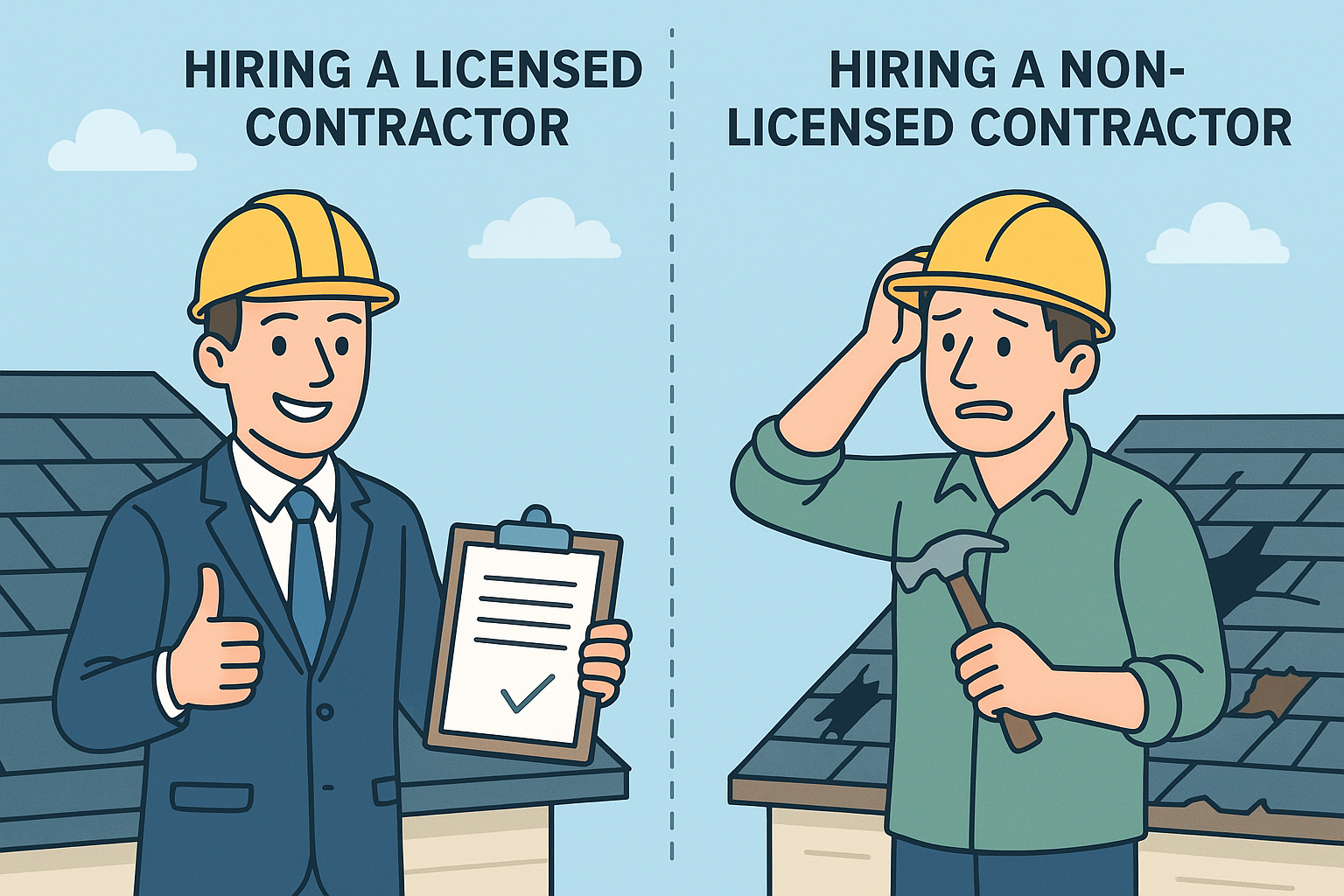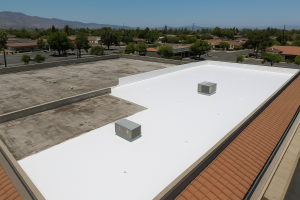Your roof is one of the most important parts of your home. It protects your family, your belongings, and the very structure of your house from rain, wind, heat, and storms. When it comes time for a roof repair or replacement, the stakes are high. Choosing the right contractor can mean the difference between a roof that lasts 20+ years and one that fails within a few seasons.
While some homeowners may be tempted to hire an unlicensed contractor to save money, this decision often comes with risks that outweigh any short-term savings. Below, we’ll break down the importance of hiring a licensed and insured roofing contractor versus the potential dangers of hiring someone who lacks credentials.
1. What It Means to Be Licensed and Insured
Licensed Roofing Contractors
A licensed roofer has met state or local requirements to legally perform roofing work. These requirements vary but usually include:
- Passing exams on building codes and industry standards
- Demonstrating years of experience or apprenticeship
- Providing proof of insurance and bonding
- Maintaining continuing education in safety and materials
Insured Roofing Contractors
Insurance typically includes:
- General Liability Insurance – protects your property if the roofer damages your home while working.
- Workers’ Compensation Insurance – covers medical costs if a worker gets injured on your property.
Unlicensed Contractors
On the other hand, unlicensed roofers often lack formal training, are not regulated by state boards, and usually don’t carry adequate insurance. While their prices might look appealing upfront, the risks can be far more costly.
2. Protecting Your Home and Investment
Your roof is not a place to cut corners. A licensed and insured contractor provides a safety net that protects you financially and structurally.
- Quality Workmanship: Licensed roofers must adhere to local building codes, ensuring your roof is safe, durable, and compliant with regulations. An unlicensed roofer may cut corners, use subpar materials, or ignore safety guidelines.
- Manufacturer Warranties: Many roofing manufacturers only honor their warranties if installation is done by a licensed contractor. If you hire an unlicensed roofer and something goes wrong, you may be left paying out-of-pocket for repairs that could have been covered.
3. Financial and Legal Protection
One of the most important differences between licensed and unlicensed roofers comes down to liability.
- With a Licensed & Insured Roofer:
If something goes wrong — for example, a worker falls off a ladder or your property is accidentally damaged — their insurance covers it. You’re not on the hook. - With an Unlicensed Roofer:
You, the homeowner, may be held responsible for injuries or damages. If a worker without insurance gets hurt on your property, you could face lawsuits and significant financial losses.
This isn’t just a hypothetical risk. Every year, homeowners find themselves in legal battles or facing unexpected expenses because they hired someone who wasn’t properly insured.
4. The Risk of Shoddy or Unsafe Work
Unlicensed roofers often don’t have the same training or accountability. That means:
- They may not know proper installation techniques.
- They may ignore local building codes.
- They may reuse old or defective materials.
- They may disappear after being paid, leaving unfinished work.
A roof that isn’t installed correctly can cause leaks, mold, structural damage, and even collapse in severe cases. What might look like a cost-saving decision today could result in thousands of dollars in repairs tomorrow.
5. Accountability and Trust
Licensed roofing contractors operate under strict guidelines. If they fail to deliver quality work, you can report them to the licensing board. This creates accountability.
Unlicensed contractors, on the other hand, answer to no one. If they take your deposit and disappear, or if their work fails within a year, you have little to no legal recourse.
6. Safety Standards Matter
Roofing is one of the most dangerous construction jobs. Licensed roofers must follow Occupational Safety and Health Administration (OSHA) guidelines and state safety laws. They invest in safety training, harness systems, and protective gear.
Unlicensed roofers often skip safety procedures to save time and money — increasing the risk of accidents on your property.
7. Long-Term Peace of Mind
When you hire a licensed and insured contractor, you’re not just paying for materials and labor — you’re buying peace of mind. You know your contractor has the proper training, follows the law, and is covered by insurance.
With an unlicensed roofer, you’re left hoping nothing goes wrong. But when it comes to your home’s roof, “hoping” is never a good plan.
8. The Bottom Line: You Get What You Pay For
While unlicensed roofers may offer a lower price, that discount often comes at the expense of quality, safety, and protection. In reality, you may end up paying much more in repairs, legal fees, or replacements down the road.
Hiring a licensed and insured roofing contractor is not just the smarter choice — it’s the safer choice.







